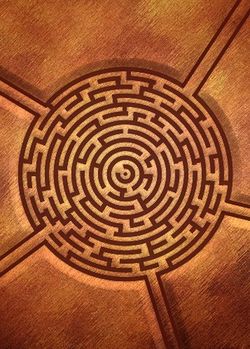Prospero
Eternal of Autumn
Sobriquets
Known as the Golden Prince, Prospero is the master of influence, favours and serendipity.
He is commonly referred to as the Weaver, and the Lord of the Loom. He is the Sovereign Lord of the City of Bridges and the Prince of Ties. He is sometimes referred to as the Reckoner of Ebony and Bone in reference to the ledgers in which he records his favours and enmities. His love of influence sometimes leads to him being called the Golden Spider or the Threadweaver. Very old sources sometimes call him Cloven-hoofed, apparently a metaphor for the mountain-goat-like dexterity with which he navigates the difficult terrain of the halls of power.
In Asavea he is called Polymitarius or el tejedor; in Jarm he is called Jemný Pavouk which translates a something akin to Subtle Spider. The magicians of the Sumaah Republic consider him, along with Estavus and Ephisis to be an acceptable eternal to treat with, and they call him Skredderen - yet while they may communicate with him, it is illegal for any citizen of Sumaah to owe Prospero a favour.
Prospero always appears to be male, and uses male pronouns.
Appearance
Prospero is always finely dressed; he displays his wealth, power and influence in his garments and accoutrements. His curving horns are often gilded, and he drips with fine jewelry. He is invariably friendly, affable, gregarious and loquacious. He enjoys verbal fencing and clever conversation, especially when it is accompanied by food or drink. Debate and discourse are his meat-and-drink. He is slow to anger, but utterly implacable when his ire is raised. The angrier Prospero becomes, the colder his demeanour and the more cutting his comments. On the few occasions Prospero has genuinely lost his temper, he is said to turn his entire will to ruining the target of his ire.
Prospero rules the City of Bridges. Built on a thousand small islands, connected by bridges in an impossible variety of styles, it is a city-sized maze of white marble and gold. Said to be one of the richest and most beautiful cities in the Autumn Realm, it is an urban wonderland of well-maintained parks, plazas, fora, public buildings and princely villas. Traveling between islands is possible only via the bridges - no boats ply the dark waters of the allegedly bottomless lake. The layout is unchanging but incredibly intricate, and is said to be impossible for visitors to navigate without assistance from the residents - who of course demand favours or services in return for their guidance. While the majority of buildings are single storey affairs, the impossibly tall towers of Prospero's palace dominate the skyline, a visible reminder to all the inhabitants of who rules here.
The Weaver is not a warrior, but is said to be the most potent magician of the Autumn eternals, at least on par with Meraud in Summer, Sadogua in Night and Kimus in Day. He is always equipped with potent magical items that enhance his already formidable supernatural powers; the nature of these items changes regularly. On occasion he lends one to a mortal in return for some valuable service.
Prospero never appears alone. He is usually accompanied by two or three "nobles" from his city, chosen for their talents and unique skills. These courtiers share their Prince's love of conversation, and may have boons of their own to offer.
The Golden Spider is known to project an aura similar to the Chamber of Pallas, encouraging everyone in his vicinity to engage in discussion and eschew confrontation. This power is especially potent when combined with a feast or banquet.
The Lord of the White City is associated with Hirmok, rune of dominion and with Lann rune of bargains. Unlike many eternals he is also associated with astronomantic constellations; in this case the Chain, Spider and Web. According to Prospero and his heralds, these constellations can be seen in the sky above the City of Bridges just as they can in the mortal world.
Concerns
Prospero prides himself on being the image of a wise ruler, who exerts the maximum amount of influence with the minimal amount of effort. He is well loved by the inhabitants of his city, and respected even by his enemies. He stands at the centre of an impossibly complex web of favour, patronage and influence - what he cannot achieve by calling in a favour directly, he can often manage by calling in a favour from someone who is owed a favour by his target.
Wealth is useful to Prospero, but it is not an end in itself. As far as the Sovereign Lord of the City of Bridges is concerned, being prosperous and secure allows one the freedom to focus on politics and personal ambitions - the poor and powerless are trapped in cycles of desperation that prevent them achieving their goals. "There are few things more depressing than a farmer," he is often quoted as saying, "unless it is a slave. I would always choose the company of the landowner or the merchant over the farmer."
Prospero is also disdainful of the trade of goods - it is a useful tool, but objects are nothing compared to the talents of individuals. Gold and silver are cold and worthless compared to the talent that lies in the hands and mind of the jeweler and the silversmith. It is the merchant who creates wealth, not the goods they traffick in - and the best merchants wield the subtle tools of influence to increase their prosperity. He has several times expressed scorn for the Imperial Bourse while praising the Imperial Senate as "a good idea, for all that it still has a little way to go."
The Echoing Market, which lies at the heart of the City of Bridges, is a unique bazaar where no goods change hands - rather, the merchants here trade in favours. Many eternals associated with Prospero insist on writing down favours owed on strips of paper, which they treat as the physical manifestation of the favour. Anyone who presents the paper can claim the favour - and there is a brisk exchange with a complex rate. Two favours from a soldier might equal a major favour from a grocer; the favour of a Cardinal of the Way might fetch a price of six minor favours from various diplomats to the courts of Jarm. Mortal magicians may sometimes engage in trade for favours, but woe betide anyone who attempts to avoid or welch on an owed favour. A favour recorded on the papers of the Echoing Market is said to be able to reach beyond death, to call back a spirit or perhaps even to influence a mortal who has been reborn from the Labyrinth again.
When someone makes an agreement with Prospero (or angers him), he has one of his scribes or aides make a note of it, and the paper is dispatched to the City of Bridges to be entered in one of his ledgers. He rarely bothers to invoke the Lictors to safeguard his agreements - but anyone who attempts to betray Prospero is likely to find that offending someone with an innate understanding of synchronicity can be extremely painful. Prospero is not cruel, particularly; only the most heinous offences against him cannot be at least partially resolved with a heartfelt apology and an offer of favours.
The Golden Prince aspires to be a scion of subtlety. Where his rival Basileus Flint rules with a fist of iron, Prospero weaves threads of favour and patronage to influence the members of his court - and indeed anyone else who interacts with them. Despite his emphasis on subtlety and influence, Prospero has little time for either deception or treachery. Wherever he can he encourages honest dealings, where everyone involved knows what they are getting in to. Only in the realm of trading favours does this honest approach begin to break down a little - but the assumption in the Court of Flowers is always that someone who offers a favour without placing limitations on it or defining how the favour can be spent - or traded - deserves everything they get.
Within the Empire, Prospero is known to favour the League's style of favour and influence, and appears to have a great deal of respect for the Net of the Heavens philosophy as practiced by the Urizen. He is believed to be fascinated by the Marches, and on several occasions has attempted to increase the power of the market towns over that of the Stewards - although always through proxies rather than direct action. When it comes to the Freeborn Prospero appears conflicted; he appreciates their directness and honesty, but finds their "obsession" with money to be a little off-putting.
The Imperial Synod is said to intrigue Prospero - he sees a lot to approve of in the teachings of Loyalty and Ambition, while viewing the virtues of Wisdom and Vigilance in particular as being largely irrelevant. His heralds are always careful to remain polite to priests they encounter, and Prospero appears more than happy to assist those priests who treat him with respect.
Perhaps unsurprisingly, Prospero is fascinated by the Imperial favour, and it is believed he will offer a valuable boon to anyone who willingly gives an existing favour into his control.
Boons
Prospero is the master of bonds. He can effortlessly create and dissolve bonds between people and magic items, and between groups of people. He is known to be able to exert his will to forge bonds that are extremely difficult to unravel, or to carefully unpick complex bonds created by others. From time to time he demonstrates the ability to manipulate the bonds between members of a band in remarkable ways - for example, he once wove the bonds of the Whisper of the North cabal with an enchantment that allowed them to perform more rituals than other covens, although the price he required in return allegedly involved the magicians influencing the Varushkan senators in some profound (but secret) fashion.
This facility for bonds also manifests in the ability to employ an effect similar to Ties that Bind at will, and to empower mortal magicians to perform the ritual with greater facility.
His understanding of the connections between people, places and things gives him an innate sense for synchronicity and serendipity - the way that events can combine to influence seemingly unrelated circumstances. This takes a number of forms, but he is known to be able to grant boons that empower rituals such as Streams of Silver, Rivers of Gold, Winds of Fortune and Gift of the Wily Broker. Furthermore, his fascination with influence sometimes manifests in boons that strengthen the ties of loyalty between individuals such as Circle of Gold or Mantle of the Golden Orator.
This perception of synchronicity means that those who cross Prospero often find themselves cursed in ways that turn fortune against them. The most common effect is something similar to the ritual effect Like Water Through Your Fingers, although often more powerful. Prospero is also able to reduce or even remove the effects of this kind of curse - but generally requires a major favour for doing so.
Prospero sometimes accepts payment for his boons, but is much more interested in services or favours. An agreement to gain a boon regarding Rivers of Gold for example might include a requirement to perform the ritual once each season in a certain way for certain targets or types of targets. The exception is that Prospero has a weakness for orichalcum, and may agree to accept payment in ingots of this golden material.
The Spiders of the City of Bridges
Prospero is said to control a small army of metallic spider-like creatures who live in the City of Bridges. These creatures are rarely seen, but defend the city from attack. They are said to be able to entangle enemies in strands of metallic thread, quickly wrapping them into cocoons and rendering them immobile and powerless. While Prospero has never been known to grant control of these spiders to others, he has occasionally been known to offer boons or magical items that draw on their abilities in some way.
The Books of Ebony and Bone
Prospero keeps two immense ledgers in his palaces. One book is bound in ebony with black pages written in golden ink, in which Prospero records all the favours he is owed, and who he has traded them to. The other book, which is covered in a thin layer of dust, is bound in ivory with white pages written on in red ink. This is where Prospero records all his grudges. The book of ebony is said to fill up quickly - there are said to be twenty-three volumes of favours carefully curated by Prospero's heralds. The book of bone, however, is unique; it is no more than half filled with grudges, many of which have been expiated in one way or another.
The Loom of Stars
The Loom of Stars is an immense artifact that Prospero keeps in the centre of his palace in the City of Bridges. An incredibly complex machine made up of thousands upon thousands of coloured threads that criss-cross the chamber, sometimes crossing, sometimes tied in knots. Prospero claims that every strand represents the life of a single influential entity, and that by identifying which thread corresponds to which entity he can learn much about their relationships. The loom is ever-changing, and some Urizen stargazers say that it is a model of a part of the Net of the Heavens. According to Prospero himself, the loom contains strands connected to mortals, eternals and "other creatures" and even he does not know where it came from, nor precisely what it does.
Threadweaver
The game originates in the City of Bridges, the realm of Prospero. Rumours of the game started in the lead-up to the Spring Equinox 383YE. There was a game hosted by the Lord of the Loom during the Autumn Equinox 383YE which was attended by several Imperial citizens. Knowledge of the game has since spread across the Empire. Games of Threadweaver take place over a number of rounds, agreed beforehand by all participants.
Lots
Each player should have several distinct lots in front of them, these can be anything from a crown or a measure of ambergelt, to a favour offering a service. These are used throughout rounds to buy additional cards from the deck by placing one of their lots into the jail.
Jail
The jailer card can be used to unlock the jail, giving the person who played the card all the lots within. The jailer card can only be revealed on the player’s turn, and not at the same time as revealing a set.
Everyone involved in the game is expected to provide at least one lot for the jail but something that has become commonplace is that if the game is hosted by someone looking to demonstrate their Prosperity, such as a merchant prince of the League or a thane of Wintermark, then they often provide the greater part of the pot or even all of it.
Rounds
At the start of each round, every player receives two cards. Each player, starting with the person immediately to the left of the previous winner and proceeding clockwise, then takes their turn. A turn involves purchasing a card from the deck by providing a lot to the jail, and then one of three things: reveal the jailer card to take all lots from the jail; reveal a set to win the current round; or pass to the next player.
How the order of play is decided in the first round of a game varies; often it is the player immediately to the left of the dealer, or by general acclaim of offerings to the jail.
Winning
A round ends when the player whose turn it is reveals a set: three of the same suit, three of the same number, or two of the same and the wild card. Winning a round allows you to take a single lot from any other player.
The Deck
The game, as created by the eternal Prospero, is played with a deck of 27 cards; five suits of five cards each, a wild card, and a jailer. The suits represent the five different cities of the realm of Autumn: the City of Forges, the City of Chains, the City of Gold and Lead, the City of Locks, and of course the City of Bridges. The wild card represents Mazen of the Many Faces and the jailer serves as a reminder of the Lictors.
Other deck variants exist within the Empire such as the Varushkan deck, featuring the five territories, the volhov, and the sovereign. It is possible to play using a standard 52-card deck, the best way being to play with just four suits.



